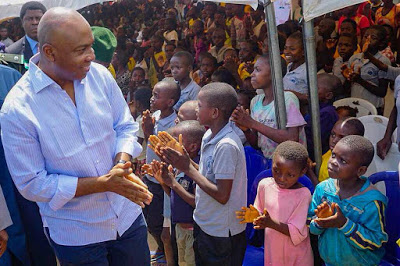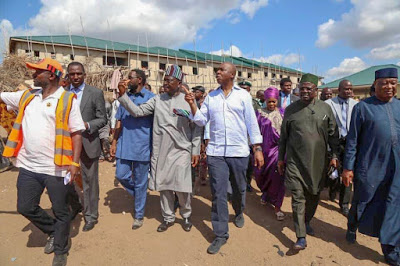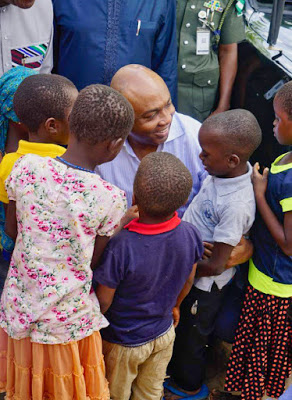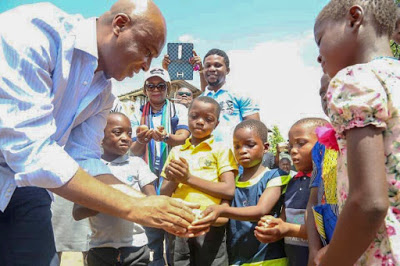
The
State shall direct its policy towards ensuring that
children, young persons and the age are
protected against any exploitation whatsoever, and against moral and material
neglect.
State shall direct its policy towards ensuring that
children, young persons and the age are
protected against any exploitation whatsoever, and against moral and material
neglect.
Section
17(3)(F), 1999 Constitution of the Federal Republic of Nigeria.
17(3)(F), 1999 Constitution of the Federal Republic of Nigeria.
On the 6th of March, 2018, the
Senate Chamber of the National Assembly passed resolutions which followed a
motion by Senator Benjamin Uwajumogu (Imo-APC) which called the attention of
the Senate to the ‘increasing rate of child labour, molestation and abuse in
Nigeria.’ Mr. Uwajumogu expressed worry over recent data published by the
National Bureau of Statistics which showed that 50.8 per cent of Nigerian
children; aged between five and 17 years are engaged in child labour.
Senate Chamber of the National Assembly passed resolutions which followed a
motion by Senator Benjamin Uwajumogu (Imo-APC) which called the attention of
the Senate to the ‘increasing rate of child labour, molestation and abuse in
Nigeria.’ Mr. Uwajumogu expressed worry over recent data published by the
National Bureau of Statistics which showed that 50.8 per cent of Nigerian
children; aged between five and 17 years are engaged in child labour.

The above statistic is very unpleasant,
especially because child labour is expressly prohibited under the Child Rights
Act, 2003. Section 28 of the Act provides that no child shall be subjected to
any forced or exploitative labour ; or employed to work in any capacity except
where he is employed by a member of his family on light work of an
agricultural, horticultural or domestic character. Most especially, Section
28(d) expressly states that no child shall be employed as a domestic help
outside his own home or family environment and further provides that any person
who contravenes the above provisions shall be liable on conviction to a fine
not exceeding fifty thousand Naira or imprisonment for a term of five years or
to both such fine and imprisonment.
especially because child labour is expressly prohibited under the Child Rights
Act, 2003. Section 28 of the Act provides that no child shall be subjected to
any forced or exploitative labour ; or employed to work in any capacity except
where he is employed by a member of his family on light work of an
agricultural, horticultural or domestic character. Most especially, Section
28(d) expressly states that no child shall be employed as a domestic help
outside his own home or family environment and further provides that any person
who contravenes the above provisions shall be liable on conviction to a fine
not exceeding fifty thousand Naira or imprisonment for a term of five years or
to both such fine and imprisonment.

However, an inspection of many Nigerian homes
will reveal that this law is hardly enforced as it is quite common to see
underage children employed as domestic staffs. There are numerous other rights
that Nigerian children are entitled to under the Child Rights Act, 2003,
including the right to free and compulsory basic education, however, this right
is also hardly adhered to by governments. Many Nigerian States are also yet to
domesticate the Child Rights Act as only about 24 states have currently done
same, a major factor which still enables child exploitation in those states.
will reveal that this law is hardly enforced as it is quite common to see
underage children employed as domestic staffs. There are numerous other rights
that Nigerian children are entitled to under the Child Rights Act, 2003,
including the right to free and compulsory basic education, however, this right
is also hardly adhered to by governments. Many Nigerian States are also yet to
domesticate the Child Rights Act as only about 24 states have currently done
same, a major factor which still enables child exploitation in those states.
Having been enacted at the National level,
the States are expected to formally adopt and adapt the Act for domestication
as State laws. This is because issues of child rights protection are on the
residual list of the Nigerian Constitution, giving states exclusive
responsibility and jurisdiction to make laws relevant to their specific
situations.
the States are expected to formally adopt and adapt the Act for domestication
as State laws. This is because issues of child rights protection are on the
residual list of the Nigerian Constitution, giving states exclusive
responsibility and jurisdiction to make laws relevant to their specific
situations.
Last year, the National Assembly held a
consultative session in the Senate with the Speakers of State Houses of
Assembly that had not domesticated the Child Rights Act, however, the remaining
states are not getting onboard as quickly as they should.
consultative session in the Senate with the Speakers of State Houses of
Assembly that had not domesticated the Child Rights Act, however, the remaining
states are not getting onboard as quickly as they should.

The Deputy Senate President, Ike Ikweremadu
has suggested a consideration of the possibility of setting up a special court
for enforcing some of these rights of the children so that those who flout them
will be punished adequately, however, this may not entirely solve the problem
of enforcement as courts only adjudicate over matters brought before them and
there currently exists family courts in the Magistrate and High Courts. I on
the other hand suggest a strengthening of the agencies responsible for
providing child care supervisory roles such as the ministries for youth
development or the creation of a child protection agency with a mandate to
critically address the protection of the Nigerian Child.
has suggested a consideration of the possibility of setting up a special court
for enforcing some of these rights of the children so that those who flout them
will be punished adequately, however, this may not entirely solve the problem
of enforcement as courts only adjudicate over matters brought before them and
there currently exists family courts in the Magistrate and High Courts. I on
the other hand suggest a strengthening of the agencies responsible for
providing child care supervisory roles such as the ministries for youth
development or the creation of a child protection agency with a mandate to
critically address the protection of the Nigerian Child.
Furthermore, the spate of insecurity in the
North – East has adversely affected many Nigerian children as the UNICEF
Nigeria Humanitarian Situation Report, 01-31 March 2018, reveals that there are
about 4.5 Million Nigerian Children in need of humanitarian assistance. As we
celebrate Children’s day, today, May 27, 2018, the issues of violence against
children, child molestation, child labour and other evils committed against
children still remain a grave concern.
North – East has adversely affected many Nigerian children as the UNICEF
Nigeria Humanitarian Situation Report, 01-31 March 2018, reveals that there are
about 4.5 Million Nigerian Children in need of humanitarian assistance. As we
celebrate Children’s day, today, May 27, 2018, the issues of violence against
children, child molestation, child labour and other evils committed against
children still remain a grave concern.
The
Child’s Rights Act 2003 (CRA) incorporates all the rights and responsibilities
of children, and which consolidates all laws relating to children into one
single legislation, as well as specifying the duties and obligations of
government, parents and other authorities, organizations and bodies. The Act
also provides for legal issues affecting the Nigerian child including, the duty
of the State to protect children and investigate the plight of children who
need special care and protection; child labour; harmful publications that
negatively influence children; adoption, custody and guardianship of children
and the Child Justice Administration system.
Child’s Rights Act 2003 (CRA) incorporates all the rights and responsibilities
of children, and which consolidates all laws relating to children into one
single legislation, as well as specifying the duties and obligations of
government, parents and other authorities, organizations and bodies. The Act
also provides for legal issues affecting the Nigerian child including, the duty
of the State to protect children and investigate the plight of children who
need special care and protection; child labour; harmful publications that
negatively influence children; adoption, custody and guardianship of children
and the Child Justice Administration system.
You may read further on the rights of
children under the Child Rights Act in this article.
children under the Child Rights Act in this article.

Adedunmade Onibokun Esq.
Images – Dr. Bukola Saraki, Senate President, Federal Republic of Nigeria, today 27th May, 2018, on a visit to the IDP Camp in Benue while spending time with the children in celebration of Children Day.
Credit – www.twitter.com/@bukolasaraki
